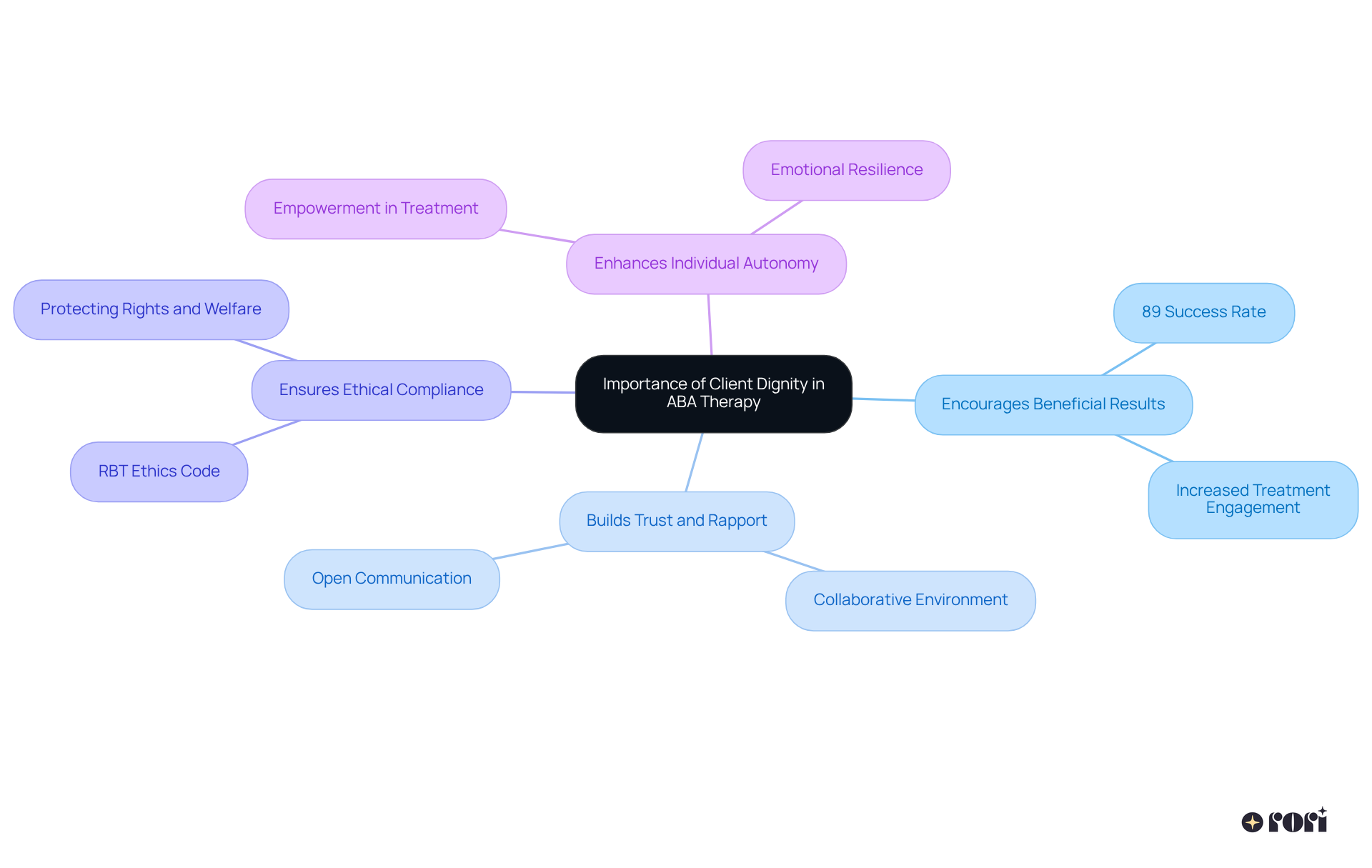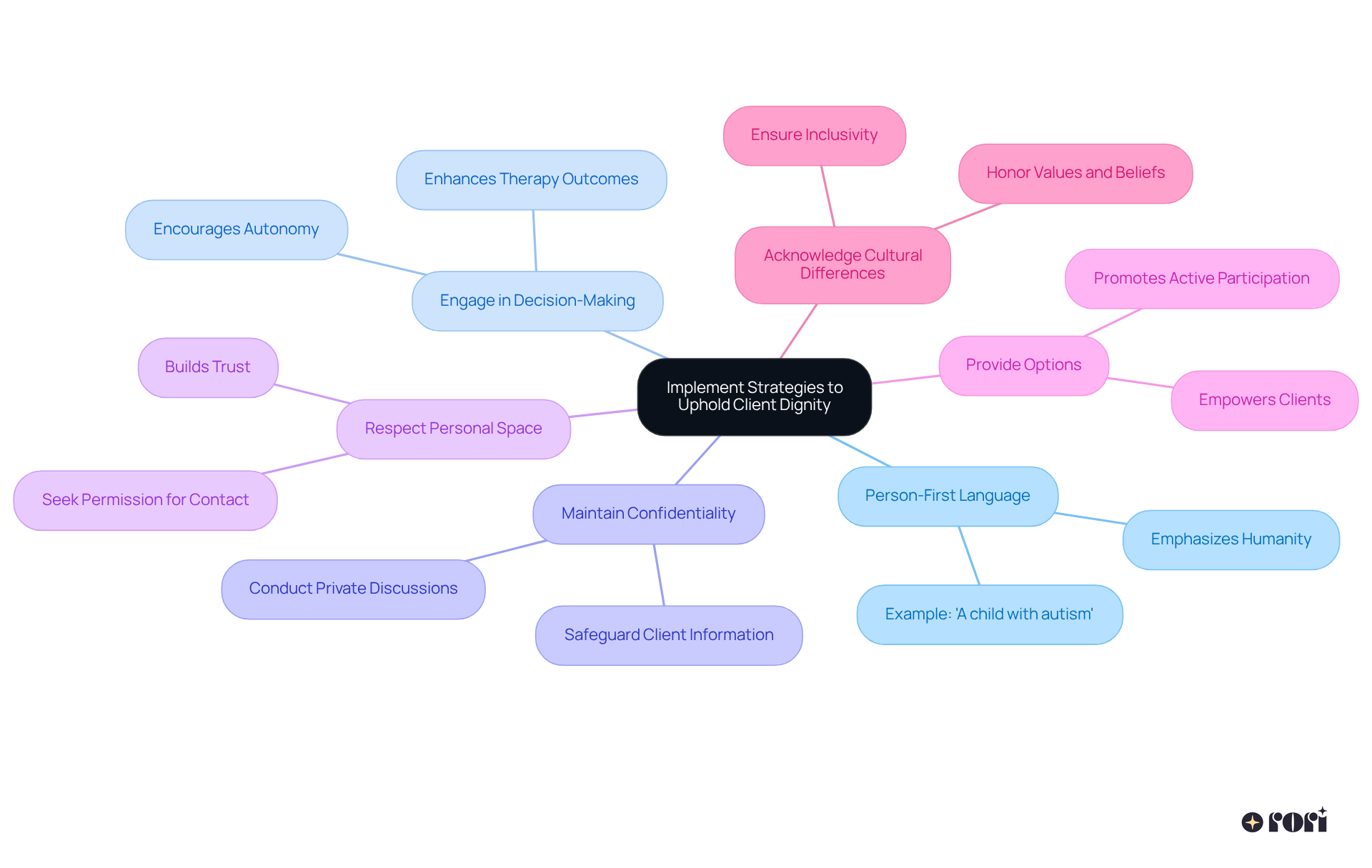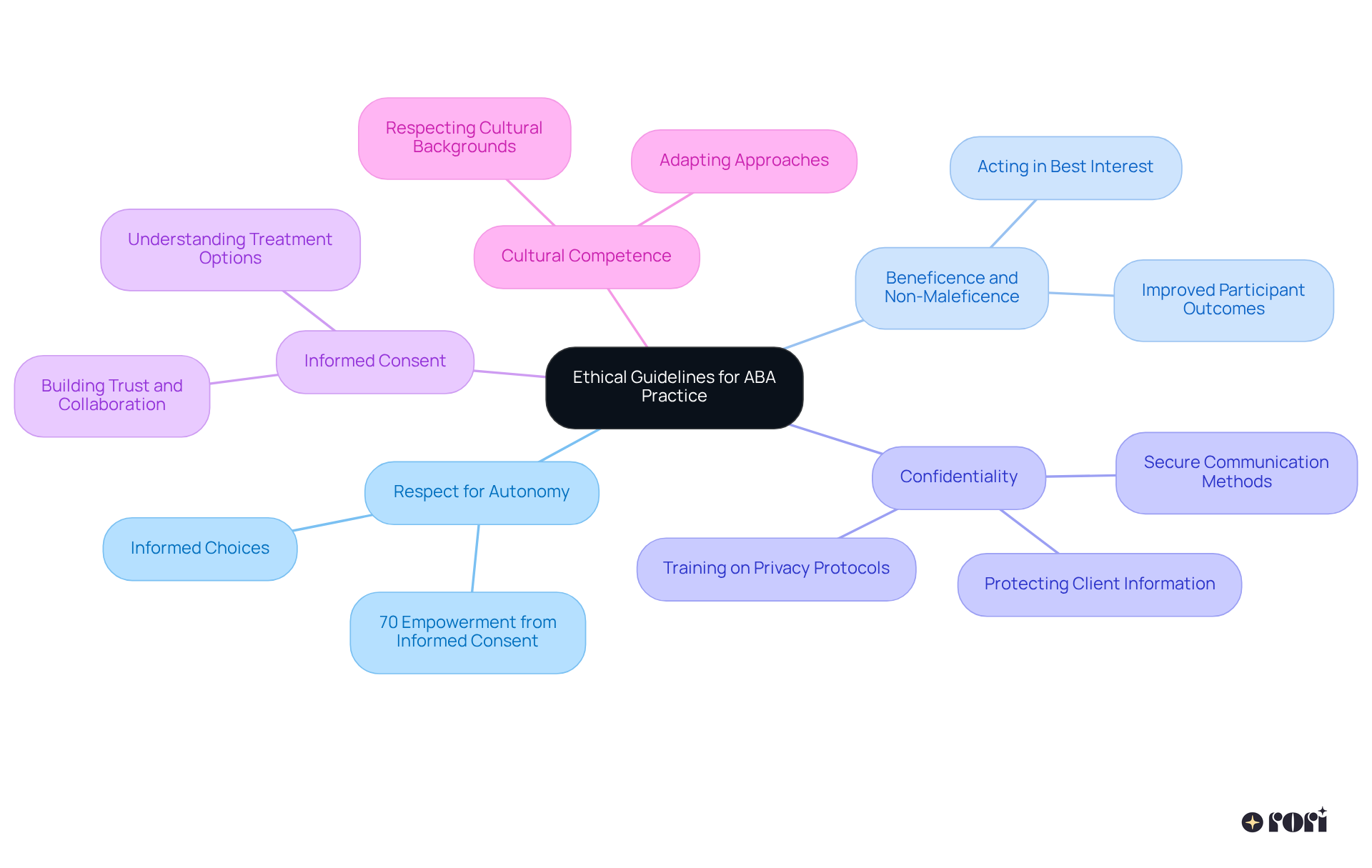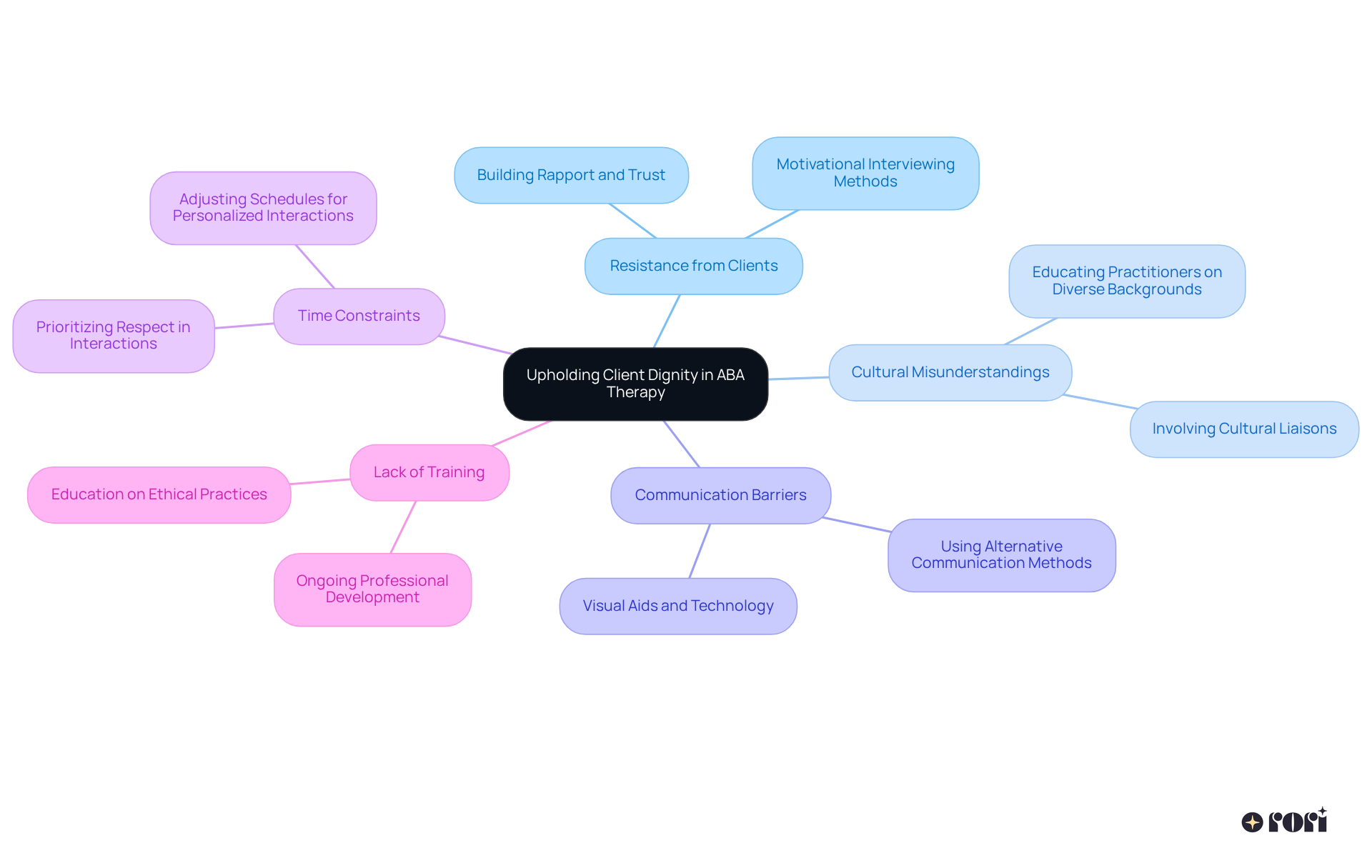Maintaining client dignity in Applied Behavior Analysis (ABA) therapy is so important for fostering positive outcomes. It helps build trust and ensures we’re following ethical guidelines. 🌟 By using person-first language, involving clients in decision-making, and respecting cultural differences, we not only enhance the effectiveness of therapy but also prioritize client autonomy and well-being. Let’s explore this together!
Maintaining client dignity in Applied Behavior Analysis (ABA) therapy isn't just a best practice; it's an ethical must that really impacts treatment outcomes. When clients feel respected and valued, they're more likely to engage in their therapy. This fosters trust and collaboration, which can make interventions even more effective.
But here's the challenge: how can practitioners consistently uphold this dignity when faced with common obstacles like cultural misunderstandings and communication barriers? 🤔 This article dives into essential strategies and ethical guidelines that can help practitioners create a therapeutic environment where client dignity is front and center. Ultimately, this leads to more compassionate and effective care. Let’s explore this together!
Maintaining client dignity ABA in intervention is all about respecting and valuing each person receiving treatment. This is super important for a few reasons:
In conclusion, maintaining client dignity ABA is essential for recognizing the importance of patient respect and creating a caring and impactful therapeutic setting. As Jesse Goldlink wisely says, "RBTs have an obligation to promote the welfare and best interests of those they serve, while also respecting their autonomy and worth." Let’s explore this together!

To uphold client dignity in ABA therapy, practitioners can implement some friendly strategies that really make a difference:
Use Person-First Language: Always refer to individuals as persons first, emphasizing their humanity over their diagnosis. For instance, say 'a child with autism' instead of 'an autistic child.' This approach fosters respect and acknowledges the individual beyond their condition.
Engage Individuals in Decision-Making: Encourage individuals to actively participate in their treatment planning. This practice not only respects their autonomy but also enhances their sense of value and engagement in the therapeutic process. Research indicates that maintaining client dignity in ABA can enhance therapy results and foster the trust essential for a robust therapeutic relationship.
Maintain Confidentiality: Safeguarding customer information is essential. Ensure that all discussions concerning the individual are conducted in private settings, safeguarding their privacy and reinforcing trust in the therapeutic relationship. Remember, confidentiality is an ethical commitment to protect individuals' personal information and experiences.
Respect Personal Space and Boundaries: Always seek permission before entering an individual's personal space or making physical contact. This practice shows respect for their comfort and autonomy, which is crucial for building a trusting relationship.
Provide Options: Whenever feasible, offer individuals choices during therapy sessions. This empowers them and reinforces their sense of control over their treatment, promoting active participation and collaboration. Providing structured options can assist in maintaining control of session objectives while empowering individuals.
Acknowledge Cultural Differences: Be sensitive to the cultural backgrounds of individuals. Adapt your method to honor their values and beliefs, ensuring that the process is inclusive and culturally competent. This aligns with the commitment to racial, cultural diversity, and inclusivity in ABA practice.
By applying these strategies, practitioners can foster a therapeutic atmosphere that focuses on maintaining client dignity in ABA, ultimately resulting in more effective and compassionate care. As one specialist pointed out, 'Maintaining the respect of individuals isn't merely an ethical requirement—it's a fundamental aspect of successful therapy.' Let’s explore this together!

Maintaining client dignity in ABA practice isn’t just a best practice; it’s a fundamental requirement outlined in ethical guidelines. Let’s take a closer look at some key ethical principles:
Respect for Autonomy: Clients have the right to make informed choices about their treatment. Practitioners should share comprehensive information to empower individuals in their decision-making. Research shows that about 70% of individuals feel more empowered when informed consent is prioritized in their treatment plans.
Beneficence and Non-Maleficence: Practitioners need to act in the best interest of the individual, ensuring that interventions are beneficial and do no harm. According to the Behavior Analyst Certification Board, ethical practice in ABA therapy significantly boosts participant outcomes.
Confidentiality: Protecting client information is a core ethical duty. Practitioners must ensure all client data remains confidential and is shared only with authorized individuals. Some specific steps to uphold confidentiality include:
Informed Consent: Before starting any treatment, practitioners must obtain informed consent from individuals or their guardians. This ensures they fully understand the nature and purpose of the interventions. Experts agree that informed consent is crucial for building trust and collaboration in the therapeutic relationship.
Cultural Competence: Practitioners should recognize and respect the cultural backgrounds of those they serve, adapting their approaches to honor these differences.
Following these ethical guidelines not only builds trust but also enhances the therapeutic experience by maintaining client dignity, ensuring that respect for individuals is upheld throughout the process. Together, we can ensure that everyone feels valued and understood in their journey.

Upholding client dignity in ABA therapy is crucial, and maintaining client dignity ABA while tackling these common challenges with effective strategies is absolutely essential! 😊
Resistance from Clients: It’s not uncommon for clients to resist treatment. Building rapport and trust is key! Practitioners can use motivational interviewing methods to boost engagement and inspire individuals to actively participate in their treatment. Did you know that 90% of individuals make remarkable progress when caregivers are involved in ABA therapy? This really highlights how vital that relationship is!
Cultural Misunderstandings: Cultural differences can sometimes lead to misunderstandings that might unintentionally offend clients. It’s important for practitioners to educate themselves about the diverse backgrounds of those they serve. When needed, involving cultural liaisons can help bridge any gaps in understanding.
Communication Barriers: For clients with communication difficulties, expressing their needs can be a challenge. Using alternative communication methods, like visual aids or technology, can really enhance understanding and foster better interactions.
Time Constraints: In busy practice settings, finding time to show respect for clients can be tough. Practitioners should prioritize respect by adjusting schedules to allow for more personalized interactions, ensuring that individuals feel valued and honored.
Lack of Training: Sometimes, inadequate training on maintaining client respect can hold practitioners back. Engaging in ongoing professional development and education about ethical practices is crucial for equipping staff with the skills they need to uphold respect in their roles.
As Ralph Moller wisely said, "This therapy has been found to be highly effective in improving IQ scores, communication skills, and language skills." By addressing these challenges head-on, practitioners can ensure that maintaining client dignity ABA is a top priority in their practice, ultimately leading to more effective and respectful therapeutic relationships. Let’s explore this together and make a difference! 🌟

Maintaining client dignity in ABA therapy is crucial for creating a respectful and effective therapeutic environment. This approach not only enhances the overall treatment experience but also leads to better outcomes for clients. When we prioritize dignity, we foster a sense of value and empowerment in individuals, which is essential for their engagement and success in therapy.
Let’s take a moment to highlight some key strategies for upholding client dignity:
These practices ensure that clients feel respected and understood throughout their therapeutic journey.
Ultimately, we can’t underestimate the importance of maintaining client dignity in ABA. It’s a vital component that influences not just the effectiveness of interventions but also the overall well-being of individuals receiving support. So, let’s reflect on these insights together and actively implement strategies that honor the dignity of our clients. By doing so, we can foster a more compassionate and successful therapeutic relationship. We’re here to help you every step of the way!
Why is maintaining client dignity important in ABA therapy?
Maintaining client dignity in ABA therapy is crucial because it encourages beneficial treatment outcomes, builds trust and rapport, ensures ethical compliance, and enhances individual autonomy.
How does client dignity impact treatment outcomes in ABA therapy?
When clients feel valued, they are more likely to engage in their treatment, leading to better outcomes. Research indicates that ABA treatment has over an 89% success rate for children with autism spectrum disorder when they feel appreciated.
What role does trust play in ABA therapy?
Trust is essential in therapy; when clients feel dignified, they are more likely to open up and share their thoughts and feelings, creating a collaborative environment that enhances therapeutic effectiveness.
How does respecting client dignity align with ethical guidelines in ABA?
Respecting client dignity aligns with ethical guidelines by ensuring that practitioners adhere to standards that protect the rights and welfare of clients, as emphasized in the Registered Behavior Technician (RBT) Ethics Code.
In what way does valuing individual autonomy benefit clients in ABA therapy?
Valuing a person's autonomy helps them feel in control and empowered, which is vital for their overall well-being. This empowerment fosters emotional resilience and encourages active participation in their healing journey.